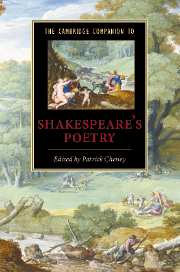Book contents
- Frontmatter
- Introduction: Shakespeare’s poetry in the twenty-first century
- 1 Shakespeare and the development of English poetry
- 2 Rhetoric, style, and poetic form
- 3 Print and manuscript
- 4 Venus and Adonis
- 5 The Rape of Lucrece
- 6 The Passionate Pilgrim and ‘The Phoenix and Turtle’
- 7 The Sonnets
- 8 A Lover’s Complaint
- 9 Poetry, politics, and religion
- 10 Love, beauty, and sexuality
- 11 Shakespeare and classicism
- 12 Poetry in Shakespeare’s plays
- 13 Poetry and performance
- 14 Reception and influence
- Reference works on Shakespeare’s poetry
- Index
10 - Love, beauty, and sexuality
Published online by Cambridge University Press: 28 May 2007
- Frontmatter
- Introduction: Shakespeare’s poetry in the twenty-first century
- 1 Shakespeare and the development of English poetry
- 2 Rhetoric, style, and poetic form
- 3 Print and manuscript
- 4 Venus and Adonis
- 5 The Rape of Lucrece
- 6 The Passionate Pilgrim and ‘The Phoenix and Turtle’
- 7 The Sonnets
- 8 A Lover’s Complaint
- 9 Poetry, politics, and religion
- 10 Love, beauty, and sexuality
- 11 Shakespeare and classicism
- 12 Poetry in Shakespeare’s plays
- 13 Poetry and performance
- 14 Reception and influence
- Reference works on Shakespeare’s poetry
- Index
Summary
Shakespeare's poems have had a long and complex literary afterlife, but these are essentially pre-modern poems. The categories that they deploy, invoke, and disrupt are not those that construct modern notions of love, desire, or sexuality, however much they may seem to resemble them. These notions are in flux, in the process of arriving at their modern formations. Yet these complex and intriguing texts are capable of effective time travel and transcending the specific conditions of their production. They are not an easy read, and consistently confound any attempt to reduce them to bland sentimentality. They have proved themselves amenable to endless appropriation and re-appropriation, as successive generations of readers have found in them expressive analogues for highly personalized states of desire and emotion. Love, for Shakespeare, is rarely an unequivocally pleasant condition; it is not even a single emotion, but rather a nexus of oppositional and often competing impulses and drives. Love is multi-faceted, emotionally complex, and involves its sufferer in a complex web of desires and deceptions. Yet love, fuelled by perceptions of beauty, and having its ultimate fleeting expression in sexual desire is, for Shakespeare, at the heart of human life. It is simultaneously origin and destination, an exhaustion of youth and vitality and a potent reminder of death, a spur to self-realization, and the potential destruction of that self.
The main poems in Shakespeare's canon consider the destructive effects of love on the self, in ways analogous to, although not identical with, the treatment of love in the plays, where it is inflected profoundly by genre. The price of Tarquin’s satisfaction of lust is Lucrece’s self-immolation; that of Venus’s rapacious desire the death and transformation of Adonis into a ‘purple flower’ (1,168); the maiden in A Lover’s Complaint bewails the loss of her maidenhead and personhood; the speaker of the Sonnets finds himself ashamed, betrayed, alone.
- Type
- Chapter
- Information
- The Cambridge Companion to Shakespeare's Poetry , pp. 181 - 201Publisher: Cambridge University PressPrint publication year: 2007



